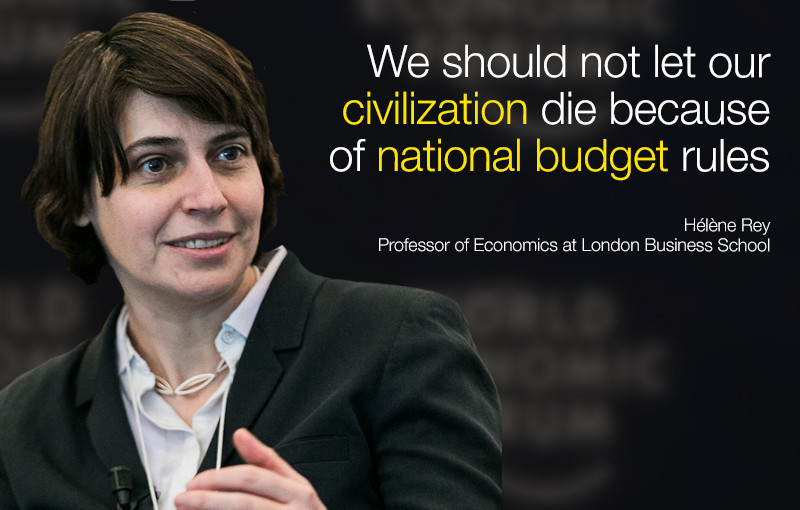3 Davos economists on Europe’s refugee crisis

Christine Lagarde, Managing Director of the International Monetary Fund (IMF) Image: REUTERS/Ruben Sprich

Get involved with our crowdsourced digital platform to deliver impact at scale
Stay up to date:
Davos Agenda
Seven years ago at Davos, the crisis threatening to rip apart the Eurozone was the ongoing financial turmoil, as an unsustainable debt bubble spectacularly burst. Today, it is a humanitarian emergency that is challenging Europe’s leaders, as millions of desperate people flee conflict in Syria, with far-reaching political and economic ramifications.
The below economists will be in Davos this week, joining discussions with leaders from business, government and humanitarian organizations to forge responses to the crisis.
1. For Hélène Rey, Professor of Economics at London Business School and the woman tipped as “the next Piketty” by The Economist magazine, the situation calls for nothing short of a “Churchill moment” from Europe’s leaders. Warning of the dangers of populism and protectionism in the face of terrorist attacks, she writes in an exclusive essay for Forum Agenda that:
“Terrorists are playing into the hands of European xenophobic parties whose mantra is to close up everything, to retreat behind borders and to blame migrants for all ills. Like the Front National in France, European extremist parties sell the electorate a delusional view of the world, in which people are supposed to take comfort in being protected behind some kind of fortified Maginot line, while forgetting our values and ruining our economies and therefore our future strength.”
She concludes by calling for:
“A large, coordinated plan to defend European borders, provide collective security and secure safe routes for asylum seekers. At the same time, Europeans have to invest massively in protecting asylum seekers, building homes and integrating them. There should be some sharing of defense spending, including for operations on foreign soil aiming at achieving collective security in Europe. There should be coordinated diplomatic efforts.”
For Rey, the very future of what it means to be European is at stake.

2. Christine Lagarde, the managing director of the International Monetary Fund, has warned of the short-term pressure that geopolitical tension and the refugee crisis will place on the global economy. However, she has also emphasised the economic benefits of integrating migrants into the workforce. In a recent article on the refugee crisis and global migration, she made the important distinction between the reasons people leave their homes:
“Cross-border migration, of course, comes in several forms. It includes both refugees who are forced to leave their country and economic migrants who voluntarily leave in search of opportunities. This total number of migrants has risen significantly in recent years, now accounting for over three percent of the global population.”
Cutting across this, economies with ageing workforces have a lot to gain from integrating young arrivals into their workforce. As she writes:
“Migrants can boost a country's labor force, encourage investment and boost growth. Preliminary IMF calculations show a modest positive impact on growth from migrants in EU countries, for example.”
“More importantly, migration can also help address the challenges from aging populations in a number of advanced countries. Over the medium term, our research shows that migrants could help reduce pressures on pension and health spending; and in the near term, the net budgetary impact tends to be relatively small.”
It’s a theme that she will likely revisit this week at Davos:
3. For Alvin Roth, a Nobel Prize-winning economist and a professor at Stanford, refugees and migration will be one of the defining challenges of 2016. In an article for Forum Agenda, he writes:
“Determining who should go where, and not just how many go to each country, should be a major goal of relocation policy. This will be important not just because we want refugees and other migrants to do well, but because it’s hard to keep them where they don’t want to be. In the US, where immigrants may relocate at will once they have entered the country, this is especially clear. So the information and preferences of the refugees themselves about where they could thrive shouldn’t be ignored.”
The Annual Meeting is taking place in Davos from 20 to 23 January, under the theme “Mastering the Fourth Industrial Revolution”.
Don't miss any update on this topic
Create a free account and access your personalized content collection with our latest publications and analyses.
License and Republishing
World Economic Forum articles may be republished in accordance with the Creative Commons Attribution-NonCommercial-NoDerivatives 4.0 International Public License, and in accordance with our Terms of Use.
The views expressed in this article are those of the author alone and not the World Economic Forum.
Related topics:
The Agenda Weekly
A weekly update of the most important issues driving the global agenda
You can unsubscribe at any time using the link in our emails. For more details, review our privacy policy.
More on Davos AgendaSee all
Andrea Willige
March 27, 2024
Shyam Bishen
March 20, 2024
Simon Torkington
March 15, 2024
Miranda Barker
March 7, 2024
Robin Pomeroy
March 1, 2024






